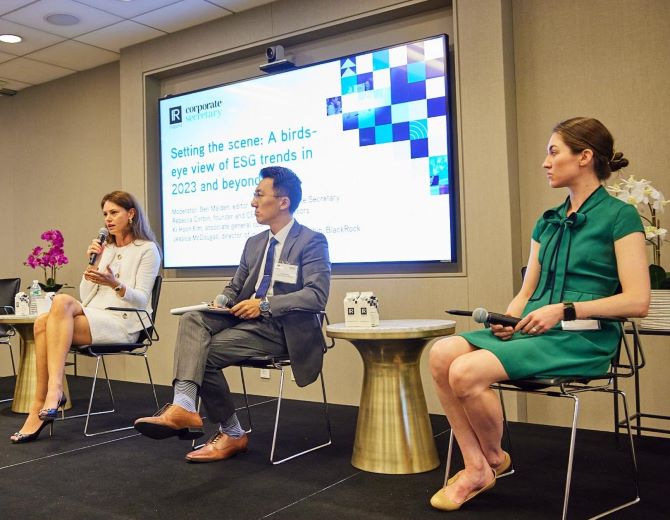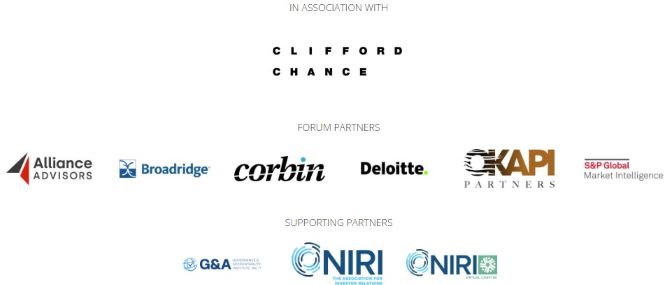The political, and in some areas financial, pushback against ESG as a concept, even as the ways in which companies and investors handle ESG-related issues continue to become more nuanced and sophisticated, was an overriding theme when investor relations and governance professionals gathered at the ESG Integration Forum – Summer in New York this month.
An array of experts from across the industry shared their insights on topics including developments in regulation and standards, producing more detailed and investor-targeted ESG data, best practices in board oversight and matching companies to sustainable investors.
Here, we’ve gathered takeaways and talking points from the event. For more information about the ESG Integration Forum – Summer, please click here.
Investor and corporate interest in ESG remains strong
Many speakers noted the emergence of an anti-ESG movement in the US, but at the same time expressed confidence that the foundations of ESG as a concept – although perhaps not as a term in itself – are sound. For example, Rebecca Corbin, founder and CEO of Corbin Advisors, began the forum by presenting the results of research conducted by her firm, including that 90 percent of investors place at least some importance on ESG when making investment decisions, the highest level ever recorded.

The research has also found that more than half of issuers note that executives consider ESG very important to their company’s long-term success, a figure that has more than doubled since 2019. Among other things, both investors and companies report using a blended approach to ESG prioritization: both as a risk-mitigation tool and as an opportunity to capture opportunities to deliver alpha.
Behind the numbers: Why ESG voting support is down
The average levels of support for ESG-based shareholder proposals declined this proxy season for the second year in a row. But many governance experts don’t attribute this trend to waning interest among investors.
Jessica McDougall, director of investment stewardship at BlackRock, noted that there has been an increase in the number of proposals that request more direct action by management rather than seeking disclosures. For example, she has seen a few proposals in the aerospace and defense sectors asking companies to stop research and development aligned with companies’ strategies. ‘For us, that is a request outside the purview of shareholders,’ McDougall said, adding that her firm would leave such decisions on strategy to the board and management.
Corbin described many shareholder proposals this past proxy season as ‘extreme’. She also described seeing a trend toward more extensive engagement between investors and management to make progress on issues as many companies embrace ESG. ‘Institutional investors are looking for progress, not perfection,’ she commented.
Should we be saying ‘ESG’?
A number of speakers and audience members expressed concerns about the usefulness of the term ‘ESG’. Such sentiments are based in part on wanting to avoid the politicization it has attracted. Opponents have seized upon it as a label with which to target their sometimes ‘anti-woke’ efforts.

Others commented that it is useful to avoid the ‘ESG’ label and instead use language that is more suitable and specific to their needs; for example, by focusing on ‘sustainability’ or ‘materiality’. BlackRock, for one, has shifted away from using ‘ESG’ toward the formulation ‘material sustainability-related risks and opportunities’.
‘Our approach has not changed. But we need to be careful about the words we use to make sure we’re conveying what we mean,’ McDougall said.
The wrong end of the stick
Emmanuelle Palikuca, managing director and head of sustainability advisory with Alliance Advisors, told the audience the backlash against ESG is based on a misunderstanding of what it means. Critics seem to believe ESG means placing environmental and social issues before profitability and financial interests, she said. In fact, she quoted an industry figure as saying that E and S issues aren’t non-financial, as critics complain, but rather pre-financial.
A number of commenters also pointed to the strength and depth of ESG investing and how it has become an integral part of many companies’ strategies. Tejal Patel, executive director of SOC Investment Group, urged companies not to ‘overcorrect’ or be deterred by anti-ESG headwinds. They should keep in place the programs they have created in areas such as diversity, equity & inclusion because investors want to see them, she said.
Growing prominence of human rights due diligence
It was noted that there is a growing focus on companies conducting human rights due diligence, in part due to new and impending EU regulations. Nadira Narine, senior program director with the Interfaith Center on Corporate Responsibility, spoke about how as shareholders her group’s members want to see companies making progress on issues such as human rights and worker rights rather than demanding that they have reached perfection.

Key questions shareholders will be asking, she said, include: are these issues on a company’s radar? Are they being discussed internally? Is the company conducting engagement with stakeholders other than investors? Has the company made public commitments and has it made disclosures about how it is managing risks in those areas?
Do boards need AI experts?
Governance professionals are among the many people considering the ramifications of artificial intelligence (AI). Like cyber-security, climate change and human capital management, AI poses new risks that boards may not be well equipped to oversee. But there are varying schools of thought on the need for specific board expertise and structures to address such topics.
Alexandra Higgins, managing director with Okapi Partners, commented that although it is important for companies in certain industries, such as medicine and technology, to have relevant expertise among board members, not every board needs to include a human resources or climate expert. That said, she added, boards without expertise in important areas need to have director education so that members can ask management the right questions.
Fellow panelist Richard Gluckselig, vice president, associate general counsel and corporate secretary with Regeneron Pharmaceuticals, agreed on the need for boards to consider their composition carefully, adding that they should avoid the ‘slippery slope’ of seeking to include an expert on every ‘issue du jour’.
Tim Ring, senior vice president and corporate secretary with MetLife, commented that it can be hard to be sure who qualifies as an expert on emerging issues. There are defined parameters for determining expertise in terms of audit committees, but these don’t yet exist in other areas, he said. Noting that the board’s role is oversight rather than management, Ring said that in these early days of AI and exploring its risks and potential, board education may well be the best way to fill the gap in terms of expertise.











